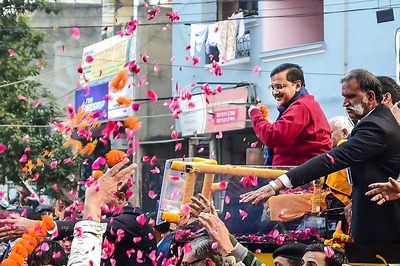
views
KOCHI: It is a quiet evening at Fort Kochi. As the dusk starts to settle, a faint music can be heard in one of its many lanes from an old wooden window. This is on the first floor of a little building on the Kalavathy road. As we climb the narrow wooden staircase below the window, the music stars to grow louder. The song we hear is the old romantic classic, 'Chaudavi Ka Chand Ho..' Sitting in the hall upstairs is a six member group of ghazal singers, most with greying hair and moustaches. These are the last few surviving members of the Thattumporam singers of Fort Kochi.“Years ago, when Fort Kochi and Mattancherry were still the commercial hubs of Kochi, there were many little buildings here whose first floors were often left vacant, and would be used by labourers working in shops downstairs or for storing goods. By evening, many of these vacant areas would be converted into musical gatherings. Singers and instrumentalists from the locality would arrive here, with their musical instruments and song after song would be belted out. People coming back after a tiring day, children, labourers, would slowly begin to gather around. It was a time when people had enough time for such recreation. It is the location of this music on the Thattumporam, the upstairs of shops, that gave the music its name,Thattumporam Sangeetham”, says the Secretary of Mehboob Memorial Orchestra. The orchestra was formed 31 years back by a number of Thattumporam singers from Fort Kochi. The members of the orchestra have unique names, often tied up with the singers they sing best, Kishore Abu, Rafi Mehboob are some examples. Though it is a tradition born in Fort Kochi, the songs of the Thattumporam singers are all old Hindi film songs and Urdu Ghazals. “When we were children, Fort Kochi was a business centre. There were lots of Marathis and Gujaratis. So we grew up listening to Hindi and Urdu songs. In the Star theatre here only Hindi movies would come. It was the only theatre in Ernakulam which had no Malayalam movies. So this influenced our music,” says Kishore Abu. Today a number of them are professional singers, singing for movies, in five star hotels, music shows, some are music directors too while others have fallen out of the mainstream. “In those days the best singers lived in penury,” smiles Kishore Abu. “Those days singing was just about collective happiness and fun. It was not about money. Yes, we would be given some money when we were invited for weddings or other such occasions, but it was just a token sum. Singers would not demand money or fix their fee as it is done today. It was the number of the audience that mattered,” says Rafi Mehboob. Mehboob gave up his government job in the police service to take up singing. “I worked only for some five years. At that time there was something called as a Police orchestra. When that was taken off, I resigned,” he says casually.“During my younger days, when these singers passed by, people would look out of the windows of their shops and homes, they were the stars here. Children like us would slip out of our homes to go to the weddings where they would perform,” says Sadiq, a professional singer from the area. Looking at them, it is hard to guess that these singers come from the working class. They are labourers, boatmen, men working in the factories, the barracks, with hardly any training in classical music. But they still have a wonderful expertise in their field. “Sing any ghazal before them and they will tell you where it is wrong. The may not be able to pin-point on the technicalities, but they can say how good or bad it is,” says Sadiq.


















Comments
0 comment